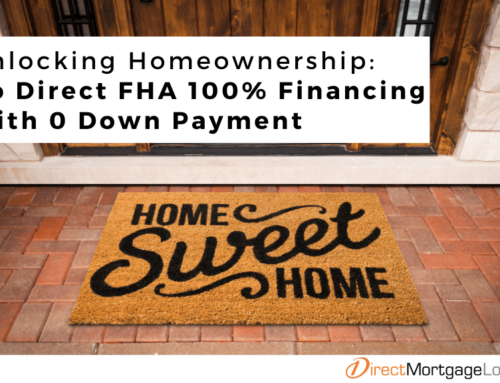A conventional loan is a cornerstone of home financing, offering a pathway to homeownership that is both flexible and widely accessible. Whether you’re buying your first home, upgrading to a larger space, or investing in a rental property, conventional loans are designed to fit a variety of financial needs. Unlike government-backed options, these loans rely on private lenders and cater to borrowers with strong credit and stable incomes. Understanding how conventional loans work and their unique benefits can help you decide if this type of financing is the right choice for your goals.
Subscribe to our blog to receive notifications of posts that interest you!
What is a conventional loan?
A conventional loan is one of the most popular options for financing a home. Unlike government-backed loans, such as FHA or VA loans, conventional loans are not insured by federal agencies. Instead, they are funded and managed by private lenders, including banks, credit unions, and mortgage companies. This type of loan offers flexibility and competitive terms for buyers who meet specific qualifications.
How does a conventional loan work?
Conventional loans work as a straightforward financing option, where borrowers receive funds to purchase or refinance a home. The approval process is based on factors like creditworthiness, income, and debt-to-income ratio. Since these loans aren’t backed by the government, lenders typically apply stricter standards to ensure borrowers can repay the loan. Conventional loans could be used for various property types, including primary residences, vacation homes, and investment properties.
Borrowers have the flexibility to choose between different loan terms, such as 15- or 30-year repayment periods, and either fixed or adjustable interest rates. Additionally, conventional loans may require private mortgage insurance (PMI) if the down payment is less than 20%.
Different Types Of Conventional Loans
Conventional loans come in various forms, each suited to different borrower needs. Here are the primary types:
Fixed Rate
Fixed-rate loans maintain the same interest rate throughout the loan term. This consistency means your monthly payments remain predictable, making it an excellent option for borrowers who prefer stability and long-term financial planning. It’s particularly beneficial during periods of fluctuating interest rates.
Adjustable Rate
ARMs start with a lower initial interest rate, often for a fixed period (e.g., 5 or 7 years). After this period, the rate adjusts periodically based on market conditions. While ARMs could provide short-term savings, borrowers should prepare for possible increases in payments over time.
Conforming Conventional Loans
Conforming loans meet the lending limits set by the Federal Housing Finance Agency (FHFA). These loans are eligible for purchase by Fannie Mae and Freddie Mac, making them easier for lenders to offer competitive terms. Borrowers who meet the criteria for a conforming loan typically enjoy lower interest rates and fees.
Jumbo Loans
Jumbo loans exceed the conforming loan limits set by the FHFA. These loans are often used to finance high-value properties but require stricter qualifications, including higher credit scores, larger down payments, and lower debt-to-income ratios.
Conventional Loan Requirements
To qualify for a conventional loan, borrowers must meet specific eligibility criteria. These include:
Conventional Loan Credit Score
Lenders generally require a minimum credit score of 620 for a conventional loan, but higher scores (700 or above) could help secure better interest rates and terms. A strong credit score demonstrates financial reliability and reduces perceived risk for lenders.
Conventional Loan Down Payment
While some conventional loans allow down payments as low as 3% for first-time homebuyers, most borrowers aim for 20% to avoid private mortgage insurance (PMI). Larger down payments not only eliminate PMI but also reduce overall loan costs and monthly payments.
Conventional Loan Interest Rates
Interest rates on conventional loans are influenced by factors like market trends, credit scores, and the size of the down payment. Borrowers with excellent credit and larger down payments often qualify for the lowest rates, resulting in significant savings over the loan term.
Loan Amounts
Conventional loans adhere to limits set by the FHFA, which in most areas is $726,200 for 2025. However, in high-cost regions, the limit can exceed $1 million, making it important to confirm local limits when applying.
Loan Terms
Conventional loans offer flexibility in terms, with common options being 15, 20, or 30 years. A shorter loan term typically comes with lower interest rates but higher monthly payments, while longer terms provide more manageable payments over time.
Rates are subject to change. Eligibility and approval are subject to completion of an application and verification of home ownership, occupancy, title, income, employment, credit, home value, collateral, and underwriting requirements. Direct Mortgage Loans, LLC NMLS ID# is 832799 (www.nmlsconsumeraccess.org). Direct Mortgage Loans, LLC office is located at 11011 McCormick Rd Suite 400 Hunt Valley, MD 21031. This is a paid endorsement. Equal housing lender.
Conventional Loan vs Government Backed Loans
Unlike government-backed loans, conventional loans aren’t insured by federal agencies like the FHA, VA, or USDA. Here’s how they compare:
- Down Payments: Conventional loans may require higher down payments compared to FHA or USDA loans, though options as low as 3% are available for eligible borrowers.
- Credit Score Requirements: Conventional loans typically demand stronger credit profiles, while FHA loans are more lenient with credit scores.
- Insurance Costs: Conventional loans avoid upfront insurance premiums like FHA loans but require PMI if the down payment is less than 20%.
- Property Options: Conventional loans are more flexible, allowing financing for second homes and investment properties, unlike most government-backed loans.
Advantages of Conventional Loans
Conventional loans offer many advantages to those looking for a more flexible loan option. Here are a few of the perks when choosing a conventional loan.
Flexible Terms
Borrowers could choose from a variety of repayment terms and structures, allowing them to tailor the loan to their financial goals.
No Upfront Mortgage Insurance
Unlike FHA loans, conventional loans don’t require an upfront mortgage insurance premium, reducing initial costs.
Property Options
Conventional loans are versatile and could be used to purchase primary residences, vacation homes, or rental properties.
Lower Costs for Strong Borrowers
Competitive interest rates and no PMI for down payments of 20% or more make conventional loans cost-effective for borrowers with excellent financial profiles.
Disadvantages of Conventional Loans
While this loan option does provide greater flexibility for the borrower, it does come with some downsides.
- Stricter Qualifications: Borrowers need higher credit scores and lower debt-to-income ratios to qualify, which may be a challenge for some.
- PMI for Smaller Down Payments: Private mortgage insurance is required for down payments below 20%, increasing monthly costs.
- Loan Limits: Conventional loans are subject to FHFA limits, which may not cover the cost of higher-priced homes in certain markets.
How To Qualify For A Conventional Loan
Qualifying for a conventional loan involves these steps:
- Check Your Credit
Review your credit score and address any issues before applying to improve your chances of approval. - Save for a Down Payment
Aim for at least 3% to qualify but consider saving 20% or more to avoid PMI. - Gather Documentation
Prepare proof of income, employment verification, tax returns, and financial statements to streamline the application process. Direct Mortgage Loans offers a free homebuyer guide, which could help you get a better understanding of what exactly is needed to go throughout the mortgage process. - Reduce Debt
Work to lower your debt-to-income ratio, as lenders prefer the ratio to be below 43% for conventional loans. - Compare Lenders
Determining the right type of lender that fits your needs is one of the most important decisions you will make during this process.
About Conventional Loan FAQ’s
Are conventional loans assumable?
Conventional loans are generally not assumable, meaning a new borrower cannot take over the existing loan and its terms. This is because most conventional loans are structured to be repaid by the original borrower under specific underwriting criteria. However, in rare cases, assumability might be possible if the loan agreement includes a specific clause allowing it. Borrowers interested in transferring their loan should consult their lender for details.
Is a conventional loan better than FHA loan?
Choosing between a conventional loan and an FHA loan depends on your financial situation and goals:
- Conventional Loans: Best for borrowers with good to excellent credit (typically 680 or higher) and the ability to make a larger down payment. These loans often come with lower long-term costs, especially when PMI is avoided. Additionally, conventional loans offer more flexibility for purchasing second homes or investment properties.
- FHA Loans: Ideal for borrowers with lower credit scores (starting around 580) or limited funds for a down payment. While FHA loans are easier to qualify for, they include mortgage insurance premiums (MIP), which could increase costs over time.
If you’re unsure, speak with a loan officer at Direct Mortgage Loans to assess which option aligns best with your needs.
Do conventional loans have PMI?
Yes, conventional loans require private mortgage insurance (PMI) if the borrower puts down less than 20%. PMI protects the lender in case the borrower defaults on the loan.
- Cost of PMI: PMI rates vary but typically range from 0.2% to 2% of the loan amount annually, depending on factors like credit score and down payment size.
- Removing PMI: Unlike FHA loans, PMI on conventional loans can be canceled once the borrower achieves 20% equity in the home. This feature helps reduce long-term costs, making conventional loans appealing to many borrowers.
Is a home inspection required for a conventional loan?
A home inspection is not required by lenders for a conventional loan, but it’s highly recommended. An inspection helps identify potential issues with the property, such as structural damage, plumbing problems, or outdated electrical systems.
- Why Get an Inspection?: While an appraisal is required to determine the property’s value, an inspection goes deeper into the home’s condition, helping buyers avoid unexpected repair costs after closing.
- Optional but Beneficial: Skipping a home inspection might save money upfront, but it could lead to costly surprises later. Protecting your investment with a professional inspection is always a wise decision.






Leave A Comment
You must be logged in to post a comment.